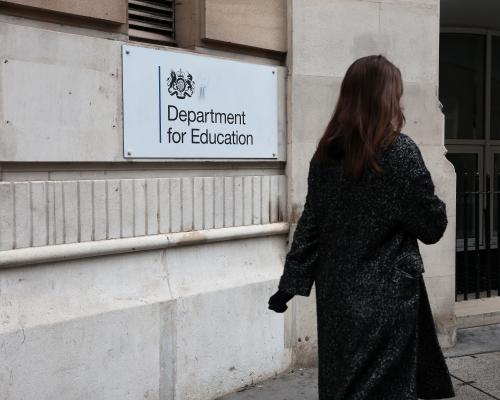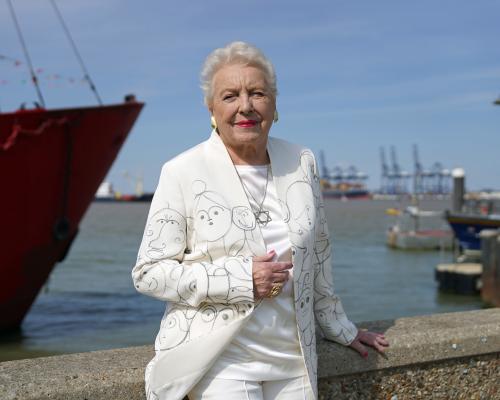
The company that runs visa services for the UK government is suing its former chief executive for £6m over her alleged improper use of profits earned during a period of record immigration.
Cloud Bai-Yun, who once represented the UK on an international ethics and fraud advisory body, is accused by Ecctis of a breach of fiduciary duty, according to court filings.
The company claims that she oversaw profit making on a not-for-profit government contract and this money was ultimately used in 2021 to pay her £17.587m for her shares in Ecctis’s holding company.
Ecctis’s claim against Bai-Yun is for £4.63m, plus more than £2m in interest.
Bai-Yun said: “I wholly deny the allegations made against me by the new management of Ecctis and will be defending myself in court.”
Ecctis runs the official language tests and qualification recognition services for those applying for certain UK visas or permissions.
Under a not-for-profit contract with the Department for Education (DfE), it is claimed that Ecctis was obliged to reinvest any profit earned or to keep a maximum of half of the net gain in reserve.
It is alleged that Bai-Yun, who was chief executive from 2014 and a director since 2006, instead improperly approved large dividend payments in 2016 and 2017 to a holding company.
Bai-Yun was the sole shareholder of the holding company and in 2021 that money was used to buy her shareholding for £17.587m, it is claimed. The shares were then transferred to an employee-owned trust.
Bai-Yun’s defence claims there were no restrictions in Ecctis’s articles of association on paying dividends and that it was for her as the shareholder to make the decisions on the payments.
The legal action by Ecctis follows its repayment to the government of £13.64m after a DfE audit concluded the company had failed to reinvest profits in its services. Bai-Yun, who had moved from being chief executive to chief adviser on the sale of her shares, was asked to resign from the latter role after the 2022 audit.
The Guardian revealed details of the scandal in January this year, leading the DfE’s most senior civil servant to tell the Common’s public accounts committee that officials had undertaken a “very hard review” of “serious failings”.
The new legal row will be an embarrassment to the DfE, which renewed Ecctis’s contract this year with changes that ensured all profits were directly paid to the government.
Insiders at the company have voiced concerns that Ecctis continues to hold a monopoly on services they say would be better run directly by the state.
Ecctis has seen a huge increase in revenue in recent years owing to historically high levels of immigration, particularly in the post-Brexit period.
According to Ecctis’s particulars of claim, the payment in 2016 of a £2.16m dividend to the holdings company was questioned at the time by the finance director at the company, Robert Wall.
Wall wrote that his understanding was that they were supposed to operate “as a not-for-profit business”, it is claimed.
Despite this, the board, with Bai-Yun in attendance, went on to approve a further dividend in 2017 of £2.5m.
Ecctis claims the dividends were “constituted almost entirely of net profit” from the government contracts, leaving it in breach of the agreement with the DfE. The company further alleges: “In February 2021, funds including the 2017 dividends were passed to the defendant as part of the £17.587m sale price.”
Ecctis’s claim for £4.6m plus interest in “remedy” covers only the 2016 and 2017 dividend payments. There is a time limitation on claims.
The claim refers, however, to the DfE’s audit which found that £16.63m in dividends were paid in total up to 2021 and that this money was ultimately “put towards the purchase price” of £17.587m paid to Bai-Yun.
Ecctis claims Bai-Yun failed in her duty as a director of Ecctis to promote the success of the company and avoid conflicts of interest.
In her defence, Bai-Yun claims the price she received for her shares was £17.5m and not £17.587m.
She claims there was no contractual restraint on the use of the balance of the net profit once appropriate investments in the services were made.
She denies a conflict of interest as she approved the dividends as the shareholder of the holding company, rather than as a director of Ecctis.
She claims Wall was mistaken in his understanding of the contract with the DfE.
A DfE spokesperson said: “Our new, strengthened contract, alongside a new leadership team at Ecctis, means the department can continue to work with Ecctis to provide a good service to the public on the recognition of qualifications, which is a requirement under international law.”







